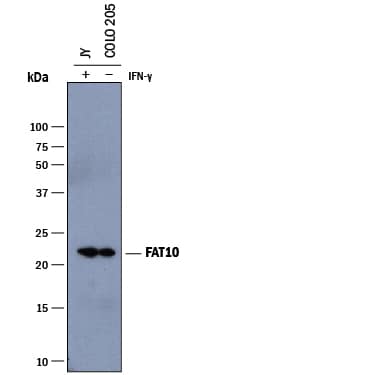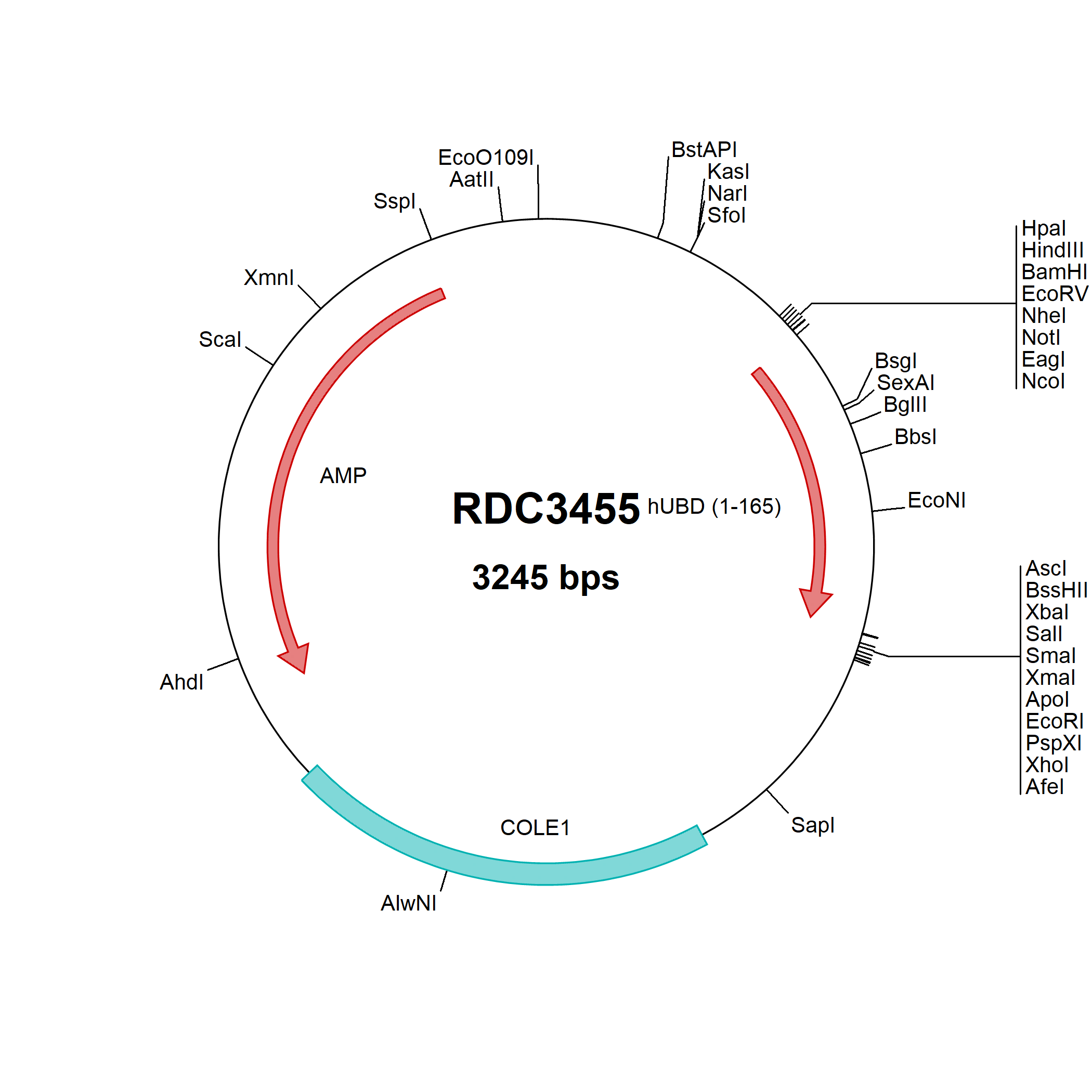FAT10 Products
Human Leukocyte Antigen-F Associated Transcript 10 (FAT10), also known as Ubiquitin D (UBD), is a 165 amino acid (aa) member of the Ubiquitin-like family of proteins. Human FAT10 has a predicted molecular weight of 18.5 kDa and shares 69% aa sequence identity with mouse FAT10. Human FAT10 mRNA is expressed as a single transcript in lymphoblastoid lines and dendritic cells, but more than one mRNA transcript has been identified for murine FAT10. FAT10 can also be induced by IFN-gamma and TNF-alpha in some cell lines. Structurally, FAT10 consists of two Ubiquitin-like domains that are connected by a short linker. Like Ubiquitin, FAT10 has a C-terminal glycine residue that can be used to form isopeptide bonds with target proteins. FAT10-conjugated proteins are targeted to the proteasome where the 26S Proteasome subunit S5a/Angiocidin binds to FAT10 and enables subsequent degradation of the conjugated protein. In addition to S5a/Angiocidin, FAT10 has been shown to interact with Huntingtin, Ataxin-1, MAD2, and NUB1L. FAT10 has been implicated in a number of biological processes such as cell cycle control, antigen presentation, and cytokine response.
41 results for "FAT10" in Products
41 results for "FAT10" in Products
FAT10 Products
Human Leukocyte Antigen-F Associated Transcript 10 (FAT10), also known as Ubiquitin D (UBD), is a 165 amino acid (aa) member of the Ubiquitin-like family of proteins. Human FAT10 has a predicted molecular weight of 18.5 kDa and shares 69% aa sequence identity with mouse FAT10. Human FAT10 mRNA is expressed as a single transcript in lymphoblastoid lines and dendritic cells, but more than one mRNA transcript has been identified for murine FAT10. FAT10 can also be induced by IFN-gamma and TNF-alpha in some cell lines. Structurally, FAT10 consists of two Ubiquitin-like domains that are connected by a short linker. Like Ubiquitin, FAT10 has a C-terminal glycine residue that can be used to form isopeptide bonds with target proteins. FAT10-conjugated proteins are targeted to the proteasome where the 26S Proteasome subunit S5a/Angiocidin binds to FAT10 and enables subsequent degradation of the conjugated protein. In addition to S5a/Angiocidin, FAT10 has been shown to interact with Huntingtin, Ataxin-1, MAD2, and NUB1L. FAT10 has been implicated in a number of biological processes such as cell cycle control, antigen presentation, and cytokine response.
| Reactivity: | Human |
| Details: | Rabbit IgG Polyclonal |
| Applications: | IHC, WB, ELISA, ICC/IF |
| Reactivity: | Human |
| Details: | Rabbit IgG Polyclonal |
| Applications: | IHC, WB, ICC/IF |
| Reactivity: | Human |
| Details: | Goat IgG Polyclonal |
| Applications: | WB |
Recombinant Monoclonal Antibody
| Reactivity: | Human, Mouse, Rat |
| Details: | Rabbit IgG Monoclonal Clone #10A6T5 |
| Applications: | WB, ELISA, ICC/IF |
| Reactivity: | Human |
| Details: | Mouse IgG2a Kappa Monoclonal Clone #7D8 |
| Applications: | WB, ELISA |
| Reactivity: | Human |
| Details: | Rabbit IgG Polyclonal |
| Applications: | WB |
| Applications: | ELISA |
| Applications: | ELISA |
| Reactivity: | Human |
| Details: | Rabbit IgG Polyclonal |
| Applications: | IHC, WB, ELISA, ICC/IF |
| Reactivity: | Human |
| Details: | Rabbit IgG Polyclonal |
| Applications: | IHC, WB, ELISA, ICC/IF |
| Reactivity: | Human |
| Details: | Rabbit IgG Polyclonal |
| Applications: | WB, ICC/IF |
| Reactivity: | Human |
| Details: | Rabbit IgG Polyclonal |
| Applications: | WB, ICC/IF |
| Reactivity: | Human |
| Details: | Rabbit IgG Polyclonal |
| Applications: | IHC, WB, ELISA, ICC/IF |
| Reactivity: | Human |
| Details: | Rabbit IgG Polyclonal |
| Applications: | IHC, WB, ELISA, ICC/IF |
| Reactivity: | Human |
| Details: | Rabbit IgG Polyclonal |
| Applications: | IHC, WB, ELISA, ICC/IF |
| Reactivity: | Human |
| Details: | Rabbit IgG Polyclonal |
| Applications: | IHC, WB, ELISA, ICC/IF |
| Reactivity: | Human |
| Details: | Rabbit IgG Polyclonal |
| Applications: | IHC, WB, ELISA, ICC/IF |
| Reactivity: | Human |
| Details: | Rabbit IgG Polyclonal |
| Applications: | IHC, WB, ELISA, ICC/IF |
| Reactivity: | Human |
| Details: | Rabbit IgG Polyclonal |
| Applications: | IHC, WB, ELISA, ICC/IF |
| Reactivity: | Human |
| Details: | Rabbit IgG Polyclonal |
| Applications: | IHC, WB, ELISA, ICC/IF |
| Reactivity: | Human |
| Details: | Rabbit IgG Polyclonal |
| Applications: | IHC, WB, ELISA, ICC/IF |
| Reactivity: | Human |
| Details: | Rabbit IgG Polyclonal |
| Applications: | IHC, WB, ELISA, ICC/IF |
| Reactivity: | Human |
| Details: | Rabbit IgG Polyclonal |
| Applications: | IHC, WB, ELISA, ICC/IF |
| Reactivity: | Human |
| Details: | Rabbit IgG Polyclonal |
| Applications: | IHC, WB, ELISA, ICC/IF |

![Western Blot: FAT10 AntibodyBSA Free [NBP2-81752] Western Blot: FAT10 AntibodyBSA Free [NBP2-81752]](https://resources.bio-techne.com/images/products/FAT10-Antibody-Western-Blot-NBP2-81752-img0001.jpg)
![Western Blot: FAT10 Antibody [NBP2-13498] Western Blot: FAT10 Antibody [NBP2-13498]](https://resources.bio-techne.com/images/products/FAT10-Antibody-Western-Blot-NBP2-13498-img0001.jpg)


![Western Blot: FAT10 Antibody (10A6T5) [NBP3-16731] Western Blot: FAT10 Antibody (10A6T5) [NBP3-16731]](https://resources.bio-techne.com/images/products/FAT10-Antibody-10A6T5-Western-Blot-NBP3-16731-img0004.jpg)

![Western Blot: FAT10 Antibody (7D8) [H00010537-M01] Western Blot: FAT10 Antibody (7D8) [H00010537-M01]](https://resources.bio-techne.com/images/products/FAT10-Antibody-7D8-Western-Blot-H00010537-M01-img0001.jpg)
![Western Blot: FAT10 Antibody [NBP1-58337] Western Blot: FAT10 Antibody [NBP1-58337]](https://resources.bio-techne.com/images/products/FAT10-Antibody-Western-Blot-NBP1-58337-img0003.jpg)
![ELISA: Human FAT10 ELISA Kit (Colorimetric) [NBP3-38790] Human FAT10 ELISA Kit (Colorimetric)](https://resources.bio-techne.com/images/products/nbp3-38790_human-fat10-elisa-kit-colorimetric-211020241529120.png)
![ELISA: Human FAT10 - Ready-To-Use ELISA Kit (Colorimetric) [NBP3-38789] Human FAT10 - Ready-To-Use ELISA Kit (Colorimetric)](https://resources.bio-techne.com/images/products/nbp3-38789_human-fat10-ready-to-use-elisa-kit-colorimetric-2110202415355094.png)
